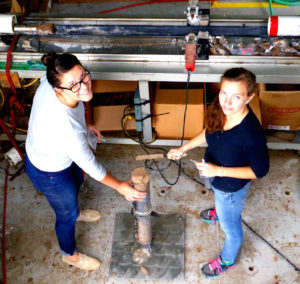
Emily Estes (right), lead author of the paper, and Boston University student Chloe Anderson section cores during an expedition in the north Atlantic Ocean on the R/V Knorr. Photo by Kevin King
WOODS HOLE – Sediments deep below the ocean floor are teaming with zombie-like microbes that, while still alive, grow in slow motion and can take decades for a single cell to divide.
A new study from the Woods Hole Oceanographic Institution is beginning to pick apart how these microbes survive by examining their source of food – nearby molecules of organic carbon.
In a paper published this week, the WHOI scientists examined long core samples taken in the middle of the north Atlantic and south Pacific oceans.
Researchers analyzed the core’s sediments and found they contained low levels of organic carbon from long-dead organisms.
Carbon like this would normally be consumed quickly by microbes, but for some reason the microbes nearby are not.
Previous research suggested the microbes weren’t “eating” the carbon because it was in a form they couldn’t metabolize.
The current study suggests that is not the case and that a more plausible answer is that the carbon has fused to minerals making it unavailable.
Researchers also feel the microbes are too sluggish to search for the sparsely dispersed carbon.
The study will help further understand the limitations of life on Earth and could help inform how life might exist on other planets.























